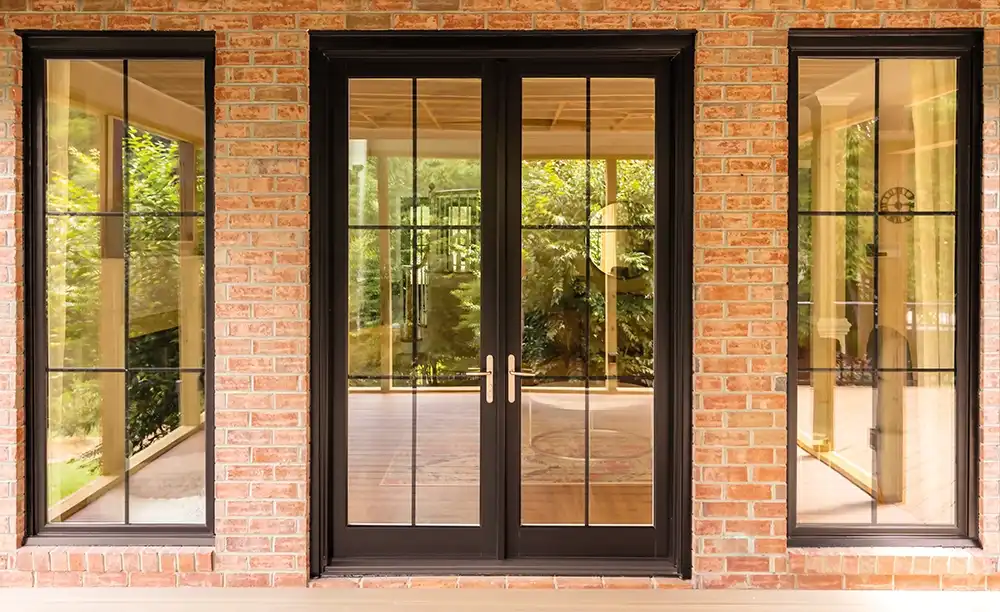
3 June 2024
Guide to Energy Efficient Doors
Energy efficient doors have tremendous value for your home. They can help turn away heat or help a home keep heat in colder climates. There are many things to consider when looking for a new energy efficient front door or patio door. Find out what makes a door energy efficient so you can make a wise decision for your home.
What is an Energy Efficient Door?
An energy efficient door has several features to defend against energy loss. Energy efficient entry doors have features like:
Insulation: Energy efficient entry doors can have insulating materials like fiberglass, wood, steel, or aluminum. Energy efficient front doors do not allow as much heat transfer as some front door materials.
Frames: The type of door material used impacts its energy efficiency. Fiberglass is an energy efficient door material because it can reduce heat transfer. Wood entry doors also have energy efficiency. Metals, like steel and aluminum can transfer heat easier than other materials. Metal conducts energy well, meaning it can transfer through it with ease. Metal entry doors can have an insulated core to improve energy efficiency.
Energy Efficient Glass: The type of window glass you use with a front door plays a role in energy efficiency. Double-paned glass with front doors can help with your home’s energy efficiency. The space between the glass has an inert, non-toxic gas that serves as an insulator. Glass can also have a special coating, known as low-emissivity (Low-E). You can get doors with glass coatings designed for your climate. Some coatings work best for hot climates because they reject solar heat. Other glass coatings work well for cold climates because they allow more solar heat to enter a home.
Weatherstripping: Weatherstripping around an entry door border can reduce air leakage. Weatherstripping helps create a seal around the door and makes your home energy efficient by keeping hot or cold air inside your home.
Thresholds and Sills: A threshold and door sill help prevent energy loss. They should have insulation to prevent heat loss through the bottom of the door. A door threshold should reduce gaps between the bottom of the door and the threshold.
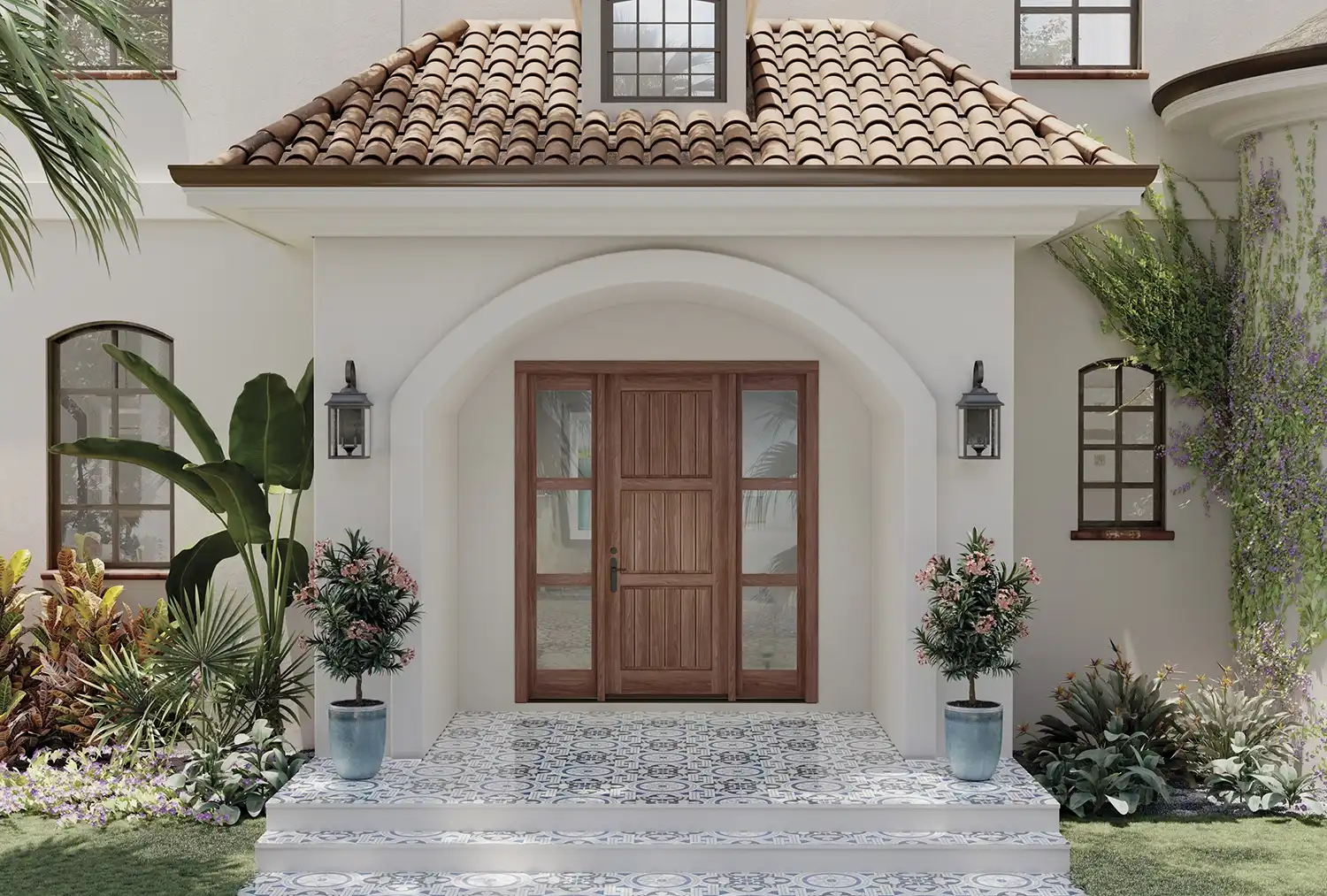
Benefits of Energy Efficient Doors
The biggest benefit of energy efficient doors is they can help reduce energy bills.1 Why does energy efficiency matter? The National Fenestration Rating Council (NFRC) estimates the average American household spends $1,500-$2,500 on energy bills each year. Around 45% of that is for heating and cooling. A new energy efficient front door can reduce drafts and provide insulating value. Glass coatings can help make your home comfortable by reducing or increasing the amount of solar heat. An extra benefit of energy efficient doors is that they reduce your carbon footprint.
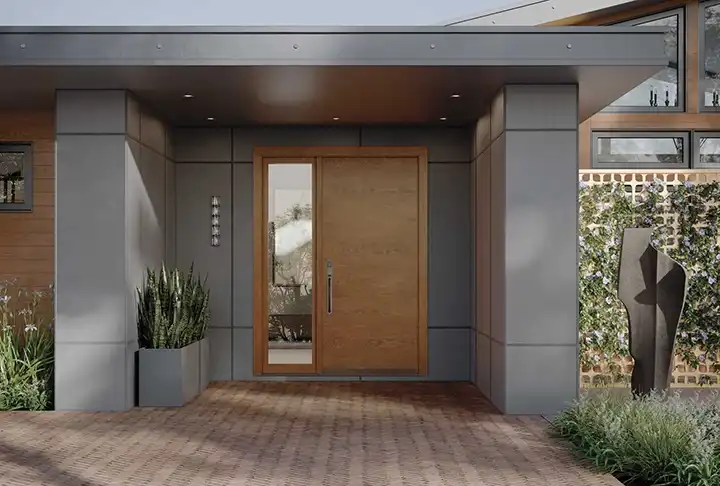
Energy Efficient Front Doors
Front doors get built with different materials. Wood, fiberglass, and steel are popular choices for entry doors. Each material has its own energy efficiency properties. It’s important to know the differences to find the front door material that suits your home the best.
Fiberglass Front Doors
Fiberglass has some of the best energy efficiency because it does not transfer much heat. It’s a durable and strong material that doesn’t warp or swell like other front door materials.
Aluminum or Steel Entry Doors
Aluminum and steel front doors are popular options, too. But since they’re metal, they conduct energy well. That means heat passes through them with ease.
Wood Front Doors
TruStile®, a Marvin® brand, uses wood for its entry doors. Wood doors have energy efficiency and can come with insulated cores to improve energy efficiency.
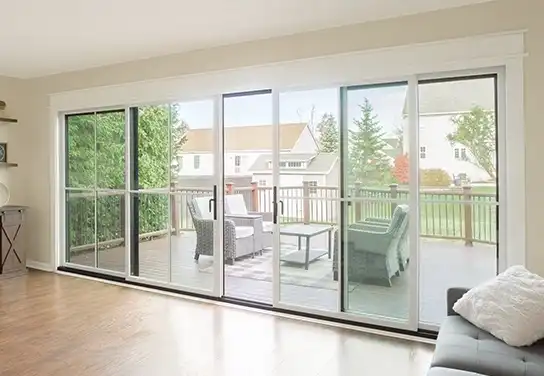
Energy Efficient Patio Doors
Energy efficient patio doors also make a big impact on your home’s energy efficiency. Since they have large glass areas it’s even more important to consider window coatings and double pane glass. With Marvin Replacement you can choose a sliding glass door, a sliding French door, an inswing French door, or a bi-fold patio door.
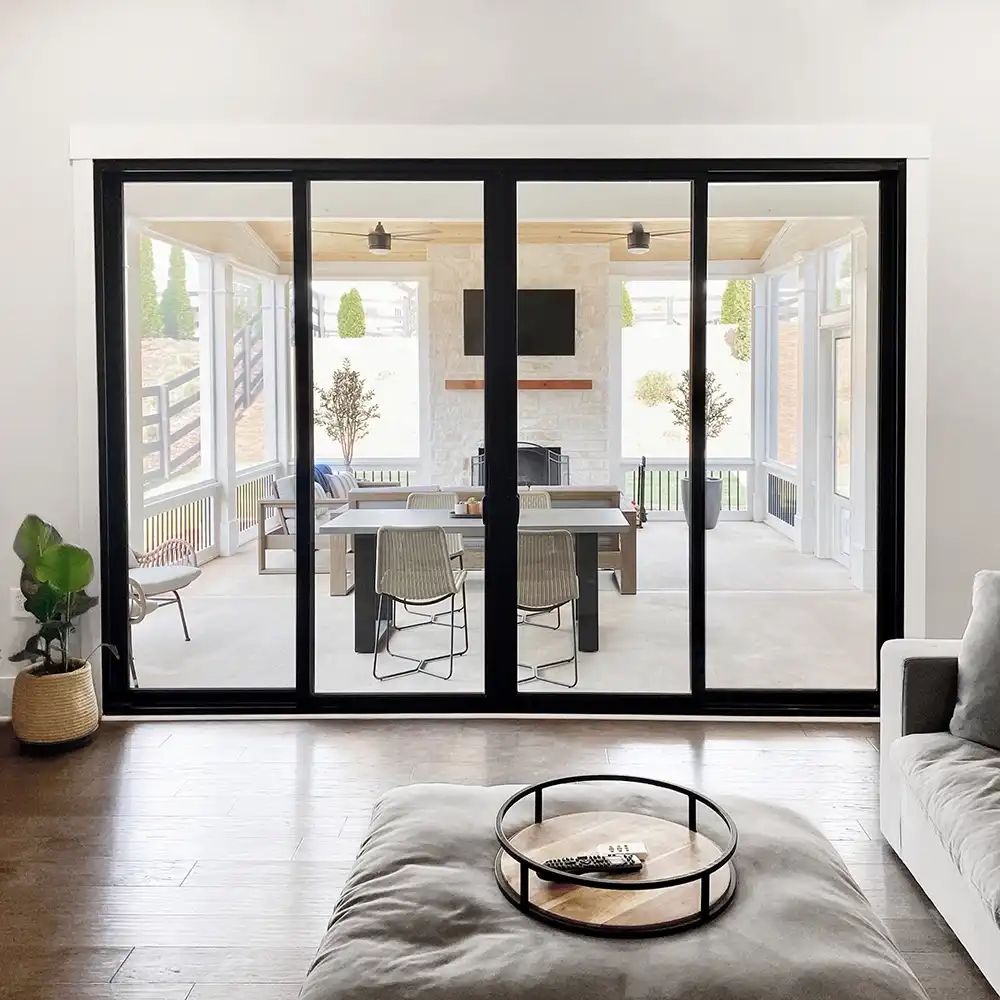
Energy Efficient Sliding Glass Doors
The most energy efficient sliding glass doors will have high quality weatherstripping, double-paned glass, and glass coatings specific for your climate. Marvin Replacement offers four glass coating options: Low E1, Low E2, Low E3, and Low E3/ERS. Our Low E1 coating works well in colder climates. It allows more heat into a home while Low E3 works well in warmer climates because it can reject solar heat. Low E3/ERS can provide efficiency year-round in all climates. The best energy efficient sliding glass doors have two panes of glass with a gas fill for insulation. An inert, non-toxic gas fills the space because it's heavier than air and reduces heat transfer.
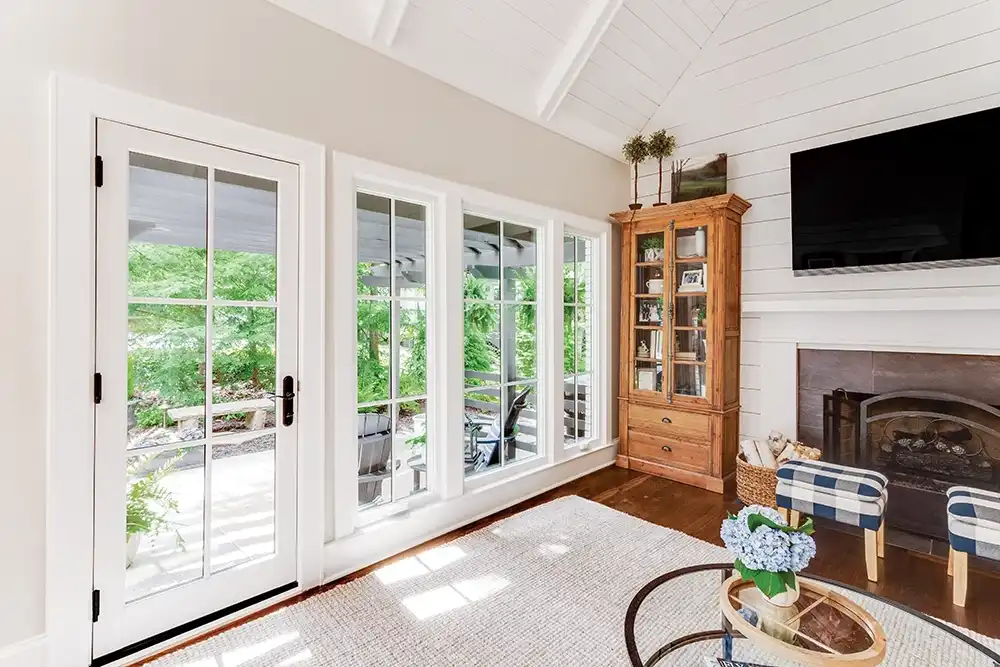
Energy Efficient French Doors
Are French doors energy efficient? Yes, French doors, also known as hinged doors, are energy efficient. French doors seal tight when closed to prevent air leakage. Homeowners often wonder about the energy efficiency between French doors vs. sliding doors. The energy efficient patio doors share similarities. But French doors and sliding doors do differ in how they function. Both types of patio doors seal tight with our multi-point locking system.
FAQs
What is the federal tax credit for energy efficient doors?
Federal tax credits for energy efficient doors can vary between legislative sessions. ENERGY STAR® has the most up-to-date tax credit information.
Are bi-folding doors energy efficient?
Marvin Replacement Bi-Folding Doors are energy efficient. Built with Ultrex® fiberglass, a material that is 5,000x less conductive than aluminum, our bi-fold patio doors can help your home keep more heat in winter and stay cooler in the summer.
How do you know if a door is energy efficient?
There are several things you can check to see if a door is energy efficient. Window labels have information, like U-Factor and Solar Heat Gain Coefficient (SHGC). U-Factor is a measure of heat loss. It can help you know how much heat inside a home is escaping. U-Factor numbers range from 0.10 to 2.00. Lower U-Factor numbers mean less heat escapes. U-Factor is the inverse of R-Value, which measures a material’s ability to resist heat transfer through it.
You can also look for an ENERGY STAR sticker. ENERGY STAR-certified doors have met a set of criteria to earn the sticker. The NFRC verifies ratings like U-Factor and SHGC to help homeowners find energy efficient doors. Replacing old doors with ENERGY STAR-certified doors can reduce energy bills.2
1Source 2023: D+R International in support of ENERGY STAR. Savings estimates are based on EnergyPlus 9.5 modeling for typical homes in 132 U.S. cities. Ranges are based on the average savings among homes in modeled cities. Actual savings will vary based on local climate conditions, utility rates, and individual home characteristics.
2Savings reflect installing ENERGY STAR certified products compared to non-certified when replacing single pane windows based on the average savings among homes in modeled cities. Actual savings will vary by product type, location, method of installation, individual home characteristics, local climate and conditions, utility rates and other factors.
You May Also Like

Types of Replacement Patio Doors
Considering a new patio door for your home? Learn more about the different types of patio doors to see which kind fits your home the best.
Types of Replacement Patio Doors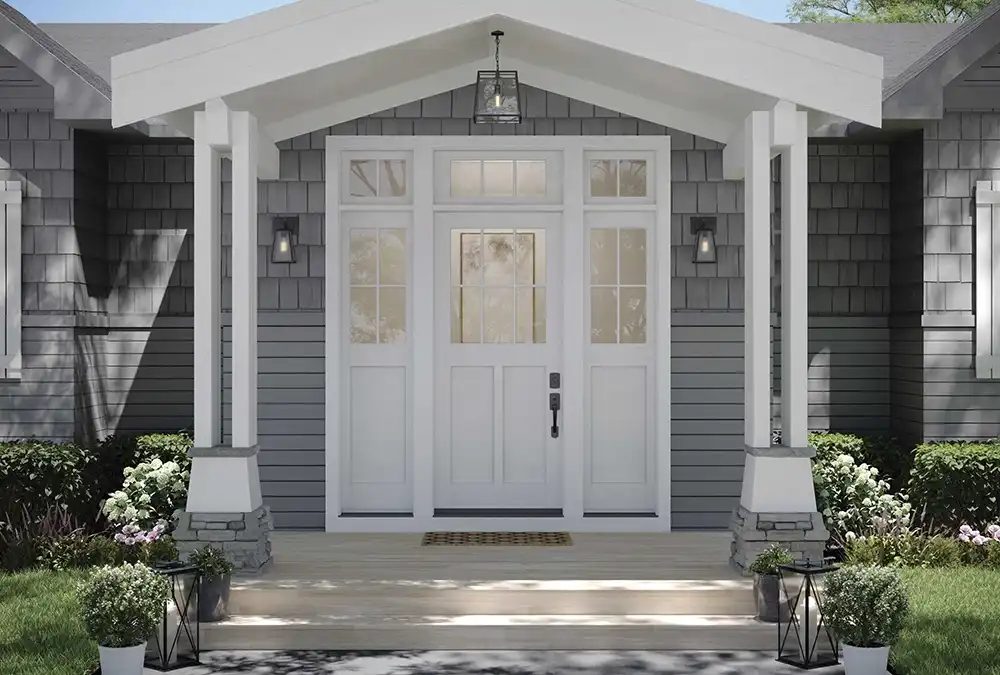
How to Pick a Front Door Color
Your front door is the first thing people see from the curb. The right door color can look inviting and warm. Find out how to pick a front door color for your home.
Front Door Colors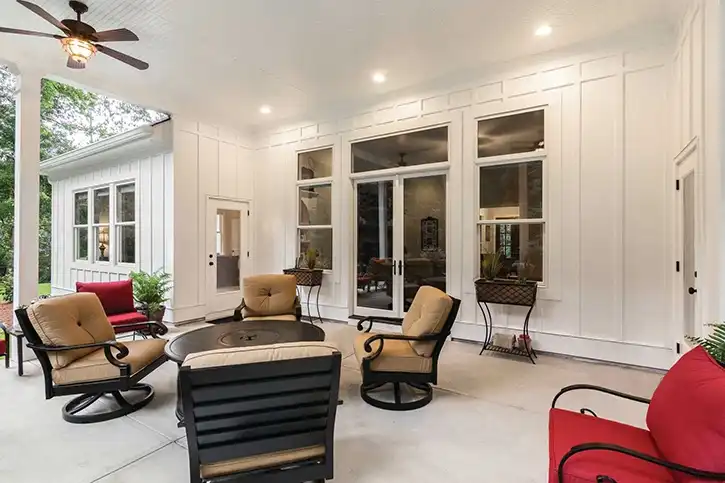
When to Replace Patio Doors
A new patio door can transform an outdoor space into something dazzling. If you're thinking about a new patio door, find out some of the signs it's time for a new patio door.
Know When to Replace Patio Doors